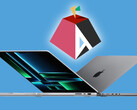
Asahi Linux gaming toolkit offers native dual boot and opens the door for more games on Apple silicon - Tested
CheckMag
Since dropping x86 in favour of ARM, Apple has more or less closed the door on native dual booting on its hardware. However, Asahi Linux, for some time, has offered native Fedora builds for Apple silicon Macs. The latest release now comes with an alpha build of their game playing toolkit, allowing you to install Steam and play a selection of games on your dual boot Apple silicon Mac.David Devey 👁 Published 🇫🇷 🇪🇸 ...
The first release of Asahi Linux was delivered in March 2022, and has now developed into a fully fledged dual boot solution for Apple silicon Macs (excluding M4). Installation is as simple as typing a prompt into the terminal and using the options to repartition your drive and install the software. Holding the power button at start up will enable you to select which operating system to boot into. It leaves your macOS installation fully intact (albeit with a smaller drive), allowing you to switch between the two at will.
Depending on what desktop environment you installed during the setup process, you'll be greeted by either a KDE or GNOME desktop. While there are some missing features, such as Thunderbolt and DP Alt mode, the overall experience is extremely polished with all the basic features you would expect. The latest release of Asahi now includes the game playing toolkit, with Vulkan 1.3, x86 emulation and Windows compatibility.
Another short terminal command will get Steam installed, and running it will drop you into Steam Big Picture mode. From there, it's more or less business as usual. Installing games was relatively painless, although Steam did crash a few times when downloading larger games.
Asahi's blog shows Control, The Witcher 3, Fallout 4 and Cyberpunk 2077 working, although I wasn't able to test these. Unfortunately, my testing yielded significantly fewer results, even when testing on a 16GB M2 MacBook Pro 16 (available on Amazon.com). Alan Wake 1, The Forest, Dead Space 2, Dead Space Remake and Far Cry 4 all failed to load. Although the latter failed because the game detected a debugger (thanks Ubisoft), otherwise it likely would have worked. Horizon Zero Dawn loaded the intro screens, then crashed. Where I did see success was in lighter titles, with The Takeover and Hollow Knight running very well indeed, even on a lowly 8GB MacBook Pro M1.
Regardless of my rather unsuccessful tests, the fact that this is even an option is a testament to the developers behind Asahi. These are Windows games running on closed source, undocumented hardware, emulating x86 (FEX), with a compatibility layer (WINE) and Proton, translating DirectX into Vulkan. That's a significant number of emulation and translation layers and the fact that anything runs at all seems incredible, let alone complex 3D titles like Cyberpunk.
You probably aren't going to replace your gaming rig with a Mac based on this, and even though Apple is making strides towards gaming, the overall selection is still somewhat limited. Asahi gives Apple users more choice, which is never a bad thing, and seemed impossible when Apple Silicon first launched. It also highlights the viability of using ARM architecture for gaming. Even though the Asahi gaming toolkit is in alpha right now, this shows a ton of potential and is certainly something to keep an eye on.












